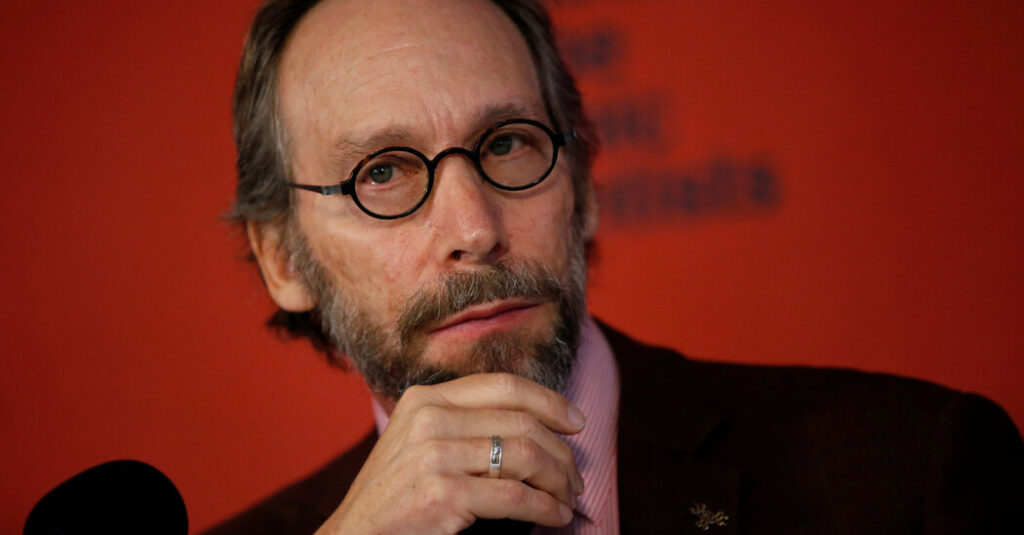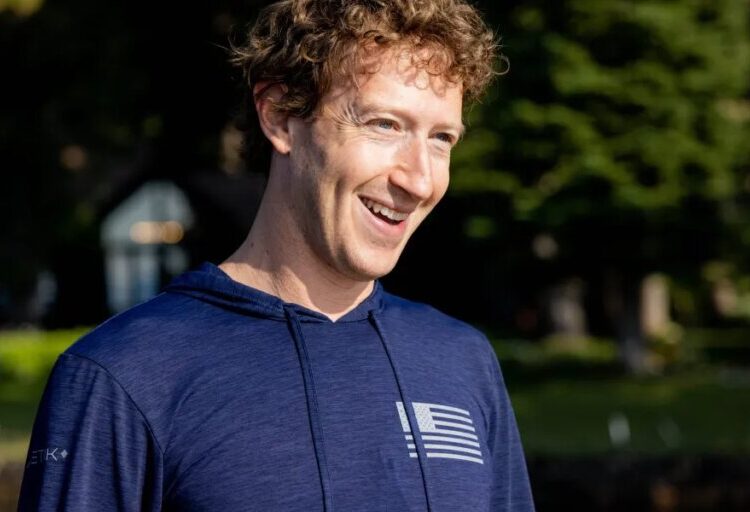In the early days of the #MeToo movement in late 2017, Lawrence Krauss, a professor at Arizona State University at the time, received a list of pointed questions from reporters at BuzzFeed News preparing an article about sexual misconduct allegations against him.
Looking for advice on how to respond, he turned to a friend who had more than a little experience taking on troubling allegations. “I think you should include a short concise cover letter. that you would like published in it entirety,” wrote the friend — the convicted sex offender Jeffrey Epstein.
Their email exchange is included in the 20,000 pages of documents acquired from Mr. Epstein’s estate, released last week by a House committee.
Mr. Epstein’s recommended defense for Mr. Krauss? “in general , these are false. they were either investigated and found lacking or ignored. etc,” Mr. Epstein wrote.
Mr. Krauss’s connection to the disgraced financier was previously known, as is the case for a number of the academics mentioned in the recent document dump. Among them was the Harvard University economist Lawrence H. Summers, who, emails show, discussed with Mr. Epstein his romantic pursuit of a woman. Mr. Summers, who previously served as Treasury secretary and Harvard’s president, has stepped back from teaching while the school reviews his links to Mr. Epstein.
But the newly released emails provide fresh insights into Mr. Epstein’s world of money and influence and how a coterie of prominent scientists, professors and researchers from elite institutions sought a piece of that world.
The emails show that even after Mr. Epstein pleaded guilty in 2008 and went to jail for solicitation of prostitution with a minor, prominent academics, including at Harvard and the Massachusetts Institute of Technology, eagerly engaged with him, seeking financial support, gossip and advice. Often, they sought to leverage his connections to raise money for their research, even after their own institutions had banned donations from Mr. Epstein.
Some of the exchanges include language denigrating to women, shared between men who never foresaw their words becoming public. In the documents, Mr. Epstein’s communications with several academics were particularly notable, although there may be others. And there could be more revelations: President Trump signed this week a bill ordering the release of more documents concerning Mr. Epstein.
Harvard is now reviewing links between Mr. Epstein and people at the university mentioned in the emails, the school has said. The professors mentioned include Elisa New, a professor of American literature, emerita; and Martin Nowak, professor of mathematics and of biology, who once led Harvard’s Program for Evolutionary Dynamics, to which Mr. Epstein had donated.
“Just like other people collect art, he collects scientists,” Mr. Nowak said about Mr. Epstein nearly two decades ago, in a Palm Beach Post article about prosecutors trying to build a sex crime case against Mr. Epstein.
Mr. Epstein died by suicide in jail in August 2019, while facing charges related to the sex trafficking of minors.
Mr. Krauss said in a statement this week that he had never hidden his association with Mr. Epstein, and that he had “sought out advice from essentially everyone I knew” when he was accused of sexual misconduct. He has maintained that the accusations are false.
“As should be noted, none of the communications with Epstein relate in any way to the horrendous crimes he was accused of in 2019,” Mr. Krauss said. “I was as shocked as the rest of the world when he was arrested.”
Mr. Krauss, who announced his retirement from Arizona State in 2018, said that Mr. Epstein, who did not graduate from college, “was fascinated by science,” and they had attended scientific meetings and salons together.
In 2018, Mr. Epstein forwarded Mr. Krauss a list of attendees for the Women in the World Summit, a convention of female leaders and activists. Mr. Krauss responded, “Let’s do a men of the world conference,” and listed men accused of misconduct: Kevin Spacey, Bill Clinton, Al Franken and Woody Allen.
The evolutionary biologist Robert Trivers is also mentioned in the new tranche of emails. In 2015, he told Reuters that Mr. Epstein had given him about $40,000 for his research. And he defended Mr. Epstein, saying girls mature sooner than they used to. “By the time they’re 14 or 15, they’re like grown women were 60 years ago, so I don’t see these acts as so heinous,” he said to Reuters.
In December 2018, Mr. Trivers emailed Mr. Epstein about funding. “Apologies for requesting support in what was originally intended as an update on work done,” he wrote. “you once said you would ‘never not support me’ but never, as we both know, is a very long time – i am much more scared of Trump’s capacity to destroy the stock market – but as long as i do not get orders from you to sell, i will ride it out.
“i hope everything is good in your life,” he wrote.
Mr. Trivers did not respond to emails seeking comment.
Ms. New, who is married to Mr. Summers, wrote to Mr. Epstein in 2015, the emails show, to thank him for a donation he had arranged. “Finally, Jeffrey, you have been such a wonderful supporter of my Poetry in America project,” she wrote. “That gift woke up the Deans to the importance of Harvard’s role in producing the highest quality humanities content in the WORLD.”
A 2020 Harvard review found that one of Mr. Epstein’s foundations claimed on tax forms in 2016 that it had donated $110,000 to a nonprofit organization of which Ms. New was president. Ms. New issued a statement this week apologizing for maintaining contact with Mr. Epstein.
After Mr. Epstein got out of jail in 2009, he embarked on a campaign to rehabilitate his public image. That effort, as reported by The Times in 2019, included placing articles on news sites.
In those articles, Mr. Epstein cast himself as a patron of science. In 2017, the emails show, Mr. Epstein reached out to Mr. Nowak to introduce him to Mr. Epstein’s publicist, Masha Drokova, to arrange an interview between the two. Following the interview, Ms. Drokova emailed Mr. Epstein to say that she “had a great conversation with Martin” and that “he loves you.”
Mr. Epstein and Mr. Nowak had a long-running personal and financial relationship. In 2003, Mr. Epstein donated $6.5 million to establish Harvard’s Program for Evolutionary Dynamics. Mr. Epstein apparently visited Harvard some 40 times after getting out of jail, a university review said.
After publishing a report on its financial ties to Mr. Epstein in 2020, Harvard placed Mr. Nowak under sanctions for two years and shuttered his Program for Evolutionary Dynamics. He remains a professor of mathematics and of biology at Harvard.
Mr. Nowak did not immediately respond to a request for comment on Friday.
Emails between Mr. Epstein and Joichi Ito, a prominent academic who ran M.I.T.’s Media Lab, show how Mr. Epstein’s influence persisted almost to his death.
Mr. Ito had accepted funds from Mr. Epstein while serving as the director of the Media Lab, a center known for its boundary-pushing research. The revelation in 2019 of Mr. Ito’s personal and financial relationship with Mr. Epstein precipitated his leaving the university, as well as roles at the MacArthur Foundation, the Knight Foundation and the board of directors of The New York Times Company.
Under Mr. Ito, the Media Lab used money provided by Mr. Epstein to support the work of Joscha Bach, an A.I. researcher, according to a 2020 M.I.T. review.
Mr. Bach appeared in last week’s document dump, writing long and often technical emails to Mr. Epstein. In 2016, he wrote to Mr. Epstein that “black kids in the US have slower cognitive development,” and “You cannot learn what does not attract your attention. Women tend to find abstract systems, conflicts and mechanisms intrinsically boring.”
Neither Mr. Ito nor Mr. Bach immediately responded to requests for comment Friday.
Mr. Epstein and Mr. Ito strategized over email in 2019 about how to fund work at M.I.T., including how to secure donations from others in Mr. Epstein’s orbit. In one exchange just months before Mr. Epstein’s death, the pair appeared to discuss how Mr. Epstein could secure additional funding for Mr. Ito’s work even after M.I.T. rejected a $25,000 donation from a foundation linked to Mr. Epstein.
“We were able to keep the Leon Black money,” Mr. Ito wrote, referring to Mr. Epstein’s associate, a former private equity executive. But, he added, “the $25K from your foundation is getting bounced by MIT.”
Mr. Epstein replied that this was “no problem” and that he was “trying to get more black for you.”
In one 2017 exchange, Mr. Epstein remarked, “with all these guys getting busted for harassment, i have moved slightly up on the reputation ladder.”
Mr. Ito replied, “#metoo is quite amazing…”
Chris Hippensteel is a reporter covering breaking news and a member of the 2025-26 Times Fellowship class, a program for journalists early in their careers.
The post The Professors Who Stayed Close With Epstein appeared first on New York Times.




